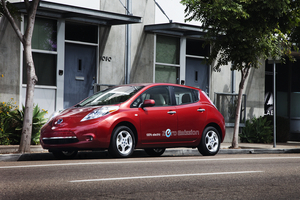|
Send this page to a friend! Fill in the form bellow | ||
news
Automakers Searching for Alternative for EVs to Reduce CO2
They must find a profitable way to reduce CO2
Automakers from all over the world are looking for more profitable ways to meet CO2 emission limits in Europe and North America. EVs have not been as popular as automakers had originally expected and have mostly lost money.
While EV’s create no direct emissions, which go a long way to decrease automakers’ average CO2 emissions, they have been very poor sellers in Europe and the US. The CO2 reduction is not enough to outset the extra costs of developing these vehicles and then having them sit on dealer lots.
The EU has mandated that automakers in Europe have average CO2 emissions for their fleet of 130g/km of CO2 by 2015 and 95g/km of CO2 by 2020. The expectation is that it could institute even lower limits after that. Meeting the 130g/km of CO2 goal, has not posed too much of a problem, but the 95g/km of CO2 limit is a much larger challenge.
“We can't get the necessary gains we need with traditional technology any more. We're seeing a real break with the past," said PSA head of innovation Jean-Marc Finot.
Automakers are working on a variety of solutions that they hope will solve the problem ranging from the realistic to the nearly science fiction. PSA Peugeot PeugeotFrance, 1882 > present120 models
PeugeotFrance, 1882 > present120 models
3839 photos
7 videos
-Citroën CitroënFrance, 1919 > present94 models
CitroënFrance, 1919 > present94 models
5346 photos
11 videos
has shown a pneumatic hybrid that it says costs the same as a battery hybrid. Toyota ToyotaJapan, 1937 > present155 models
ToyotaJapan, 1937 > present155 models
4570 photos
10 videos
and BMW BMWGermany, 1918 > present87 models
BMWGermany, 1918 > present87 models
8471 photos
43 videos
have begun working on a lithium-air battery that it claims would have the same energy volume as gasoline. Hydrogen fuel cells are still being researched, and while they technically work, they face an even bigger hurdle in terms of creating an infrastructure than pure EVs. Electricity exists near nearly every road, but there would need to be an entire logistics system created to compress and store hydrogen.
"Demand for electric cars isn't where we thought it would be. We're in a very uncertain phase, and everyone's a bit lost,” said Francois Bancon, Nissan NissanJapan, 1932 > present159 models
NissanJapan, 1932 > present159 models
6957 photos
12 videos
development chief.
The advantage of the billions spent on EVs is that the technology is easy to apply to hybrids. Even if buyers are not willing to buy pure EVs, hybrids have growing popularity, and diesel hybrids have shown the possibility of meeting the 95g/km of CO2 standard in some cases.
Hybrids offer a second advantage – no need for standardization. One of the several roadblocks towards more EVs has been no standardization in their charging. There is no guarantee when buyers get an EV that every public charger will work with their car. Hybrids are charged via either regenerative braking or charging at home. In theory they can be charged publically, but it is not a necessity.
Source: Automotive News Europe
Contribute
latest news










